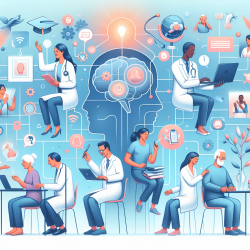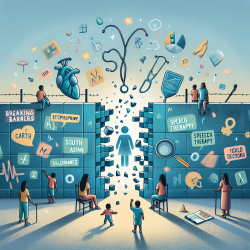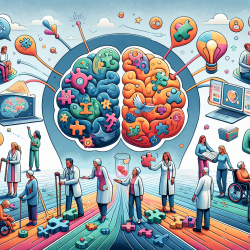As practitioners in the realm of speech therapy, especially within an educational setting, our ultimate goal is to support and enhance the communication abilities of our students. The journey of working with individuals who experience global aphasia can be particularly challenging, yet incredibly rewarding. Drawing from the insights presented in Michael Collins' research on the Diagnosis and Treatment of Global Aphasia, this blog aims to shed light on innovative strategies that can enrich our therapy practices and encourage a deeper exploration into this complex condition.
Global aphasia, characterized by severe impairments across all language modalities, demands a unique approach that transcends traditional therapy models. Collins challenges the conventional perspectives on aphasia by highlighting the importance of understanding the individuality of each case. This approach not only acknowledges the non-verbal and cognitive dimensions of the condition but also emphasizes the dynamic nature of aphasia recovery.
Here are several key takeaways from Collins' research that can inform and improve our therapy practices:
- Look Beyond Language Severity: Collins encourages therapists to consider factors beyond the severity of language impairment. This includes paying attention to the cognitive abilities and the residual skills of the person, which can play a crucial role in their recovery process.
- Embrace the Role of the Right Hemisphere: The potential involvement of the right hemisphere in language recovery post-aphasia is a fascinating area for further research and practice. This insight encourages therapists to explore and integrate activities that stimulate the right hemisphere in their treatment plans.
- Innovative Treatment Programs: Programs like Visual Action Therapy and Promoting Aphasics' Communicative Effectiveness (PACE) are highlighted as effective approaches for globally aphasic patients. These programs focus on maximizing the patient's communicative effectiveness through non-verbal means and tailored verbal exercises.
- Challenge Therapeutic Nihilism: Collins' work urges therapists to adopt a more innovative and research-oriented mindset towards the treatment of global aphasia. By challenging the prevailing attitude of therapeutic pessimism, therapists can discover new pathways to facilitate communication for their patients.
Incorporating these insights into our therapy sessions can not only enhance the quality of care we provide but also inspire us to contribute to the growing body of research in speech therapy. As we continue to explore and implement innovative treatment strategies, we affirm our commitment to supporting our students in navigating the complexities of global aphasia.
For those interested in delving deeper into the intricacies of global aphasia and its treatment, I highly recommend reading Michael Collins' comprehensive work. To read the original research paper, please follow this link: Diagnosis and Treatment of Global Aphasia.










